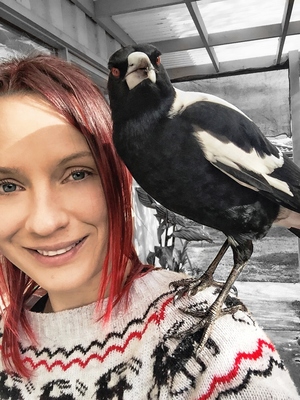Magpie-swooping season has begun early after local birds brought forward their nesting this year, according to an expert on the species.
Danielle Bam, a licensed wildlife rehabilitator specialising in magpie care, said this year’s nesting began up to a month before its usual earliest start.
“In some areas magpie breeding season varies in different parts of the country, although in our region I’ve noticed it’s usually between August and October,” Ms Bam said.
“But this year I’ve observed it has begun a lot earlier than usual. One magpie pair I’ve been following for several years laid their clutch as early as July 24 this year, whereas the previous year they did not start nesting until August 21.”
Ms Bam, who has been observing magpie behaviour since 2011, said anyone living near nesting magpies should take simple safety precautions.
Seeking alternative routes and even “making friends” with the birds could help avoid swooping, she said.
“Even if it’s walking that extra 500 metres or so to avoid the area it’s well worth it.
“If you notice a warning sign in your area, pay attention to it and leave the vicinity if possible.
“Try making friends with the magpie. Carry an appropriate food treat (magpieaholic.com/feeding-magpies) to offer the bird, which should not only distract him but he should come to see you as a friend and not a foe.”
Ms Bam cautioned against retaliation or panic.
“Don’t throw objects at it, or scream and run, as this will only aggravate it further and encourage its behaviour.”
Magpies were a protected, intelligent species that could recognise human faces, Ms Bam said.
“Magpies also have a great memory and will be able to recall your face for many years.
“If they know you and consider you as a friend, you’ll never have to worry about getting swooped. But if you’ve been mean to them then they’re likely going to target you each nesting season.”
Male magpies were the most likely to swoop in defence of nests, Ms Bam said.
“It is the male’s duty to defend the nesting area, and it’s him doing so the majority of the time.
“The female is busy brooding and guarding them against predators that may approach the nest if she were to leave.
“Although females have been observed swooping, this is only likely to occur if they have a helper magpie who can defend the nest while the female is away.”









